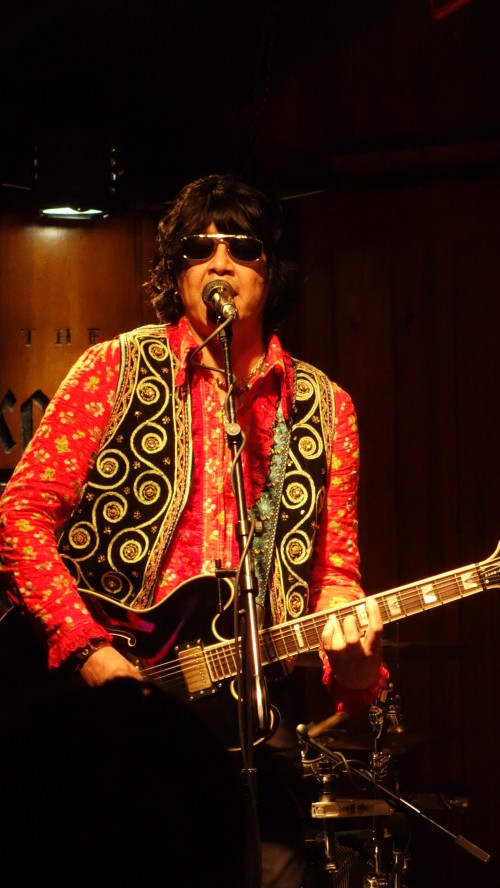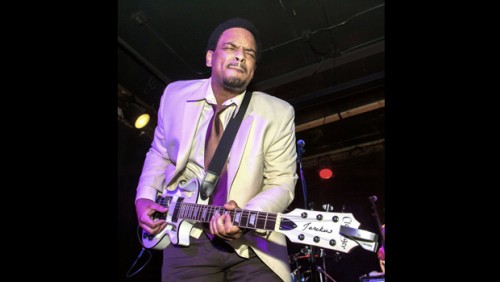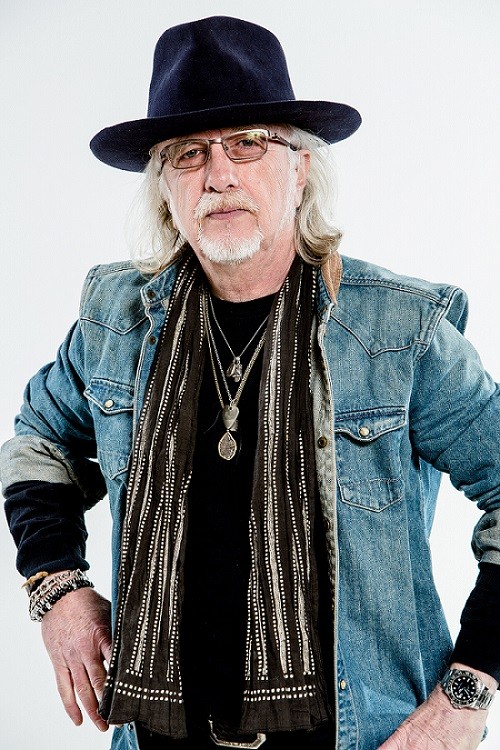Singer/songwriter/guitarist Javier Escovedo is an unsung hero of punk rock. Not only that, but he hails from a family of musicians that includes older brothers Pete, Coke and Alejandro, younger brother Mario, and niece Sheila E. In the mid-1970s, the teenage Javier joined forces with bassist Hector Penalosa, drummer Baba Chenelle, and guitarist Robert Velez (now known as El Vez). Together, they became the Zeros, one of the L.A.’s seminal punk bands. After the Zeros disbanded, Escovedo relocated to Austin, where he and Alejandro formed the more rootsy True Believers.
This year, Escovedo released his second solo album, “Kicked Out of Eden,” filled with the infectious rock and roll energy that characterized the Zeros four decades ago.
You come from a musical family. Your brothers (Pete and Coke) played Latin music. What drew you and your brothers Alejandro and Mario to punk?
Well, I guess it was probably the era that we grew up in and the area that we grew up. The older brothers grew up in Oakland, California. So they played in San Francisco in Latin jazz bands, and they were pretty big. And they packed ’em in San Francisco in the jazz scene. And they would come down and visit us every once a while in a convertible, looking like movie stars. But for me, Alejandro, and later on Mario, you knew, we grew up listening to rock.
I started learning how to play guitar a little bit from my sisters. We used to spend time between Huntington Beach and Rosarito Beach in Baja California. We had a house down there. We used to go back and forth, all the summer, any vacation. My sisters started going out with these guys, and they were in bands. And so one of them was a drummer, the other one was a guitar player. And you know, the whole band would just come and hang out with our family. We were from America and you know, we’d have parties and stuff. And you know, they started teaching me how to play guitar. And so I started learning and getting really excited about it.
You’ve said that your mother always expected her children to become musicians. How did your parents feel about you turning to punk?
They didn’t really see anything different. They didn’t really differentiate between rock and punk. My parents were a lot older than most parents. My dad was 55 when I was born. So they didn’t really go to any of our shows. They didn’t really know that much about the punk rock scene. They just knew that I was in a band, but, like, all the other brothers were in bands, too, so they were used to the idea. They bought me a station wagon so I could throw the equipment in, and stuff like that. And they were supportive.
What are your memories of the Los Angeles punk scene?
Well, we were very young, I was 19, I was the oldest, and Baba the drummer was 16, and Hector and Robert were 17 years old. So we were, like, the youngest band ever in the scene. And so it was pretty wild…because we were either just out of high school or still in high school. It was a lot of fun, it was loud. Kind of like to have your dreams come true. It was just fun and just like, we were so young. We weren’t jaded. Everything was new.
I know that people would call the Zeros “the Mexican Ramones.” Were you OK with that? No one calls the Beastie Boys “the white Run-DMC.”
Good point, good point. I was not really OK with it. I thought it was really lazy, that people would do that. I didn’t really appreciate it. I thought it was odd. And the thing about it was, we probably started around the same time as the Ramones did. But the Ramones, of course, they put out a record, they came out to California, and that inspired all the bands and everything. And they did influence us. But that wasn’t our main influence. Our main influence was like the New York Dolls, the Ventures, the Standells….But it wasn’t the Ramones. And I felt sort of shortchanged by that term.
And the Mexican side was like, you know, the LA Times said that we had “a lean, hungry barrio look.” None of us were near barrio. It was just pretty weird. I grew up in middle class Huntington Beach, which was Orange County. I wasn’t in the barrio. I didn’t really know Spanish. I thought it was kind of inaccurate and kind of odd. But it was kind of too late, and what can we do about it?
And you weren’t the only Mexican-American punks. There was Alice Bag from the Bags, right?
Right, Alice Bag. . . .That’s what I loved about the early punk scene. It didn’t exclude anybody. Everybody, gay, straight, black, white, Chicano, anybody was welcome. And that’s what was very cool about it.
There was a lot of people that were mixed-race, or minority nationality. It was cool, it was open like that, it was no big deal. There was little things that did happen and you’d hear slurs, but that’s the way it is, the way it was back then.
I know that Robert Lopez is now known as El Vez. Have you stayed in touch with him?
Yes. He’s my brother-in-law. So we stay in contact all the time. And the Zeroes play every now and then. We toured, put out records in Spain and Germany and toured a lot over there. We just played like, last year. We played in Orange County. Sort of sporadically, but we still play.
I’ve seen El Vez perform and I always think, “That guy was also in the Zeroes.” It’s a pretty interesting jump.
Yeah, you know, it’s funny, ’cause when we were forming the Zeroes, me and Robert talked on the phone all the time, and we had different ideas about the band we were going to form and what we were gonna do. And his ideas were sometimes like, a little over-theatrical, you know? So when he did El Vez, I was like, “OK, this makes perfect sense.”
After the Zeroes, can you tell me a little bit about what you were up to musically?
In ’78, the Zeroes moved to San Francisco and became a three-piece. Robert went to LA. And in ’81, you know, things changing a lot, and we felt like, punk is like, a real kinetic thing, and it was about change. It seemed like a good idea to split up and just do something new. And so I moved down to Hollywood, and my brother came through, Alejandro, he was playing with Rank and File. And he was like, “I’m gonna leave this band. Do you wanna move to Austin and form a band with me?” And I wasn’t doing anything at all. So I said, “Sure.”
Moving ahead a bit, when you put out your first solo album, what was it like to be in front after being in bands for so long?
Well, it’s not that different, you know? I always wrote my own songs. I would sing those songs. In the Zeroes, I would have them sing some of my songs in the later reunion shows. But that was just cool to break it up and have everybody sing. It’s not that different, you know, for me. Like in the Zeroes in the early days I sang all the songs, and then slowly they started writing stuff. Like Robert sang, like, one or two songs. Hector sang, like, one song. So I was kind of used to it.
But the True Believers, first it was me and Alejandro, so he sang his songs and I sang my songs. We did some singing, trying to sing harmony. Then we got John Dee (Graham, True Believers guitarist), and then we all together sang our own songs. And then, you know, I joined other bands where I didn’t sing at all.
The main reason I put out solo records is because I want to keep doing music and not have a band where people are expecting four specific people to show up. Because things change all the time, and they want to do some stuff, they don’t want to do other things, And now, me having a solo record, it’s like, who wants to go with me? “I do! I do!” “OK, let’s go.” And I don’t have to say, “Oh, I have to get this person.” I can get somebody else if they can’t do it. That’s the main reason to me. I love to be in a band. I love bands. But you get older, it’s like…it just kind of ends up that way. You form bands when you’re real young and then you stick together and stick together. Then you kind of grow apart. When you’re older, it’s not that easy to form that band again.




Leave a Reply